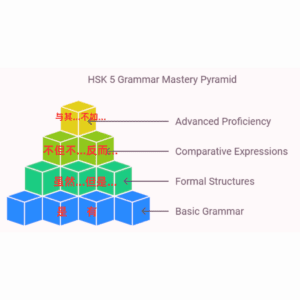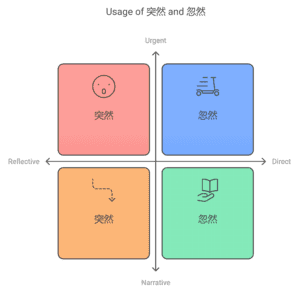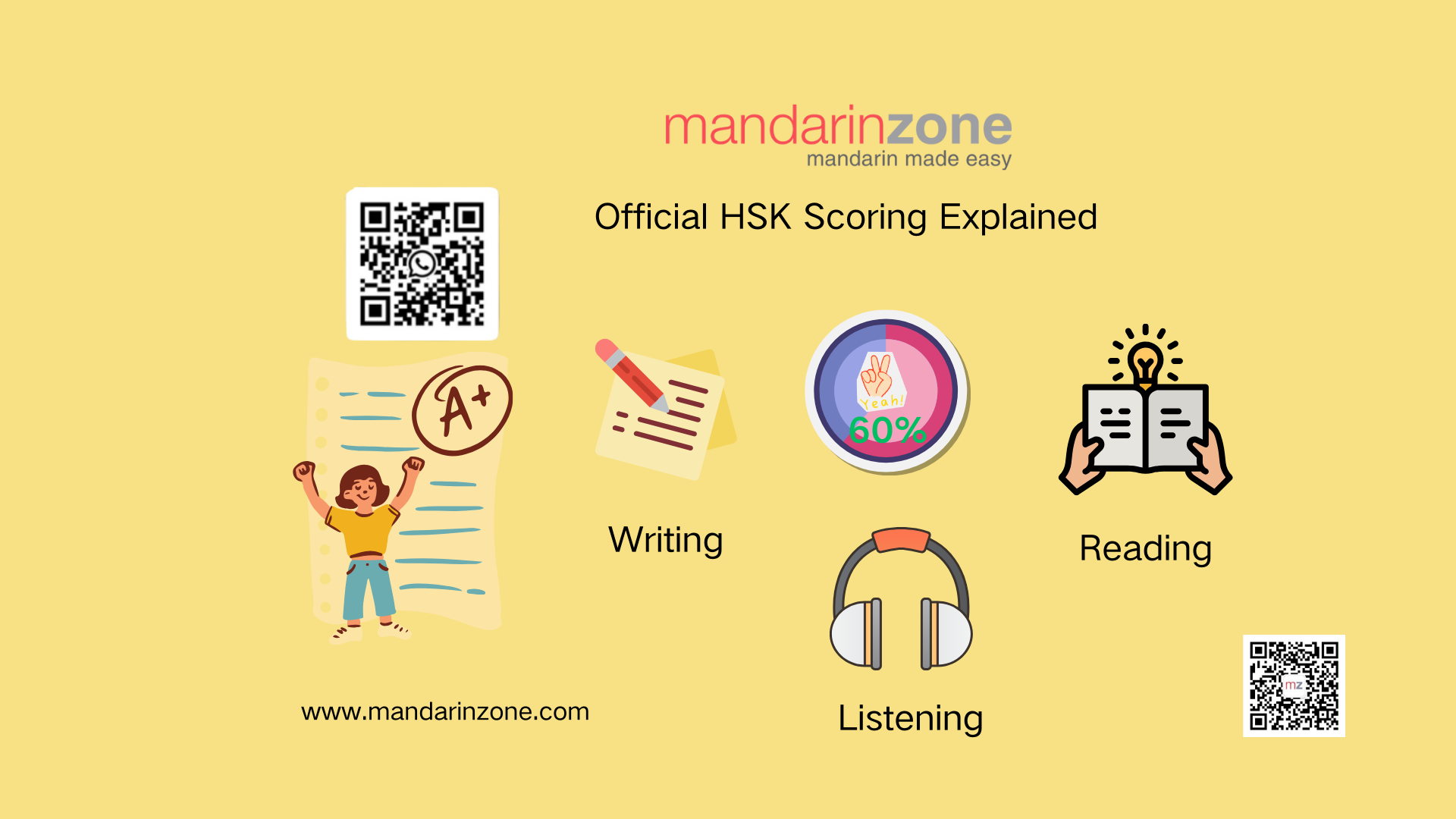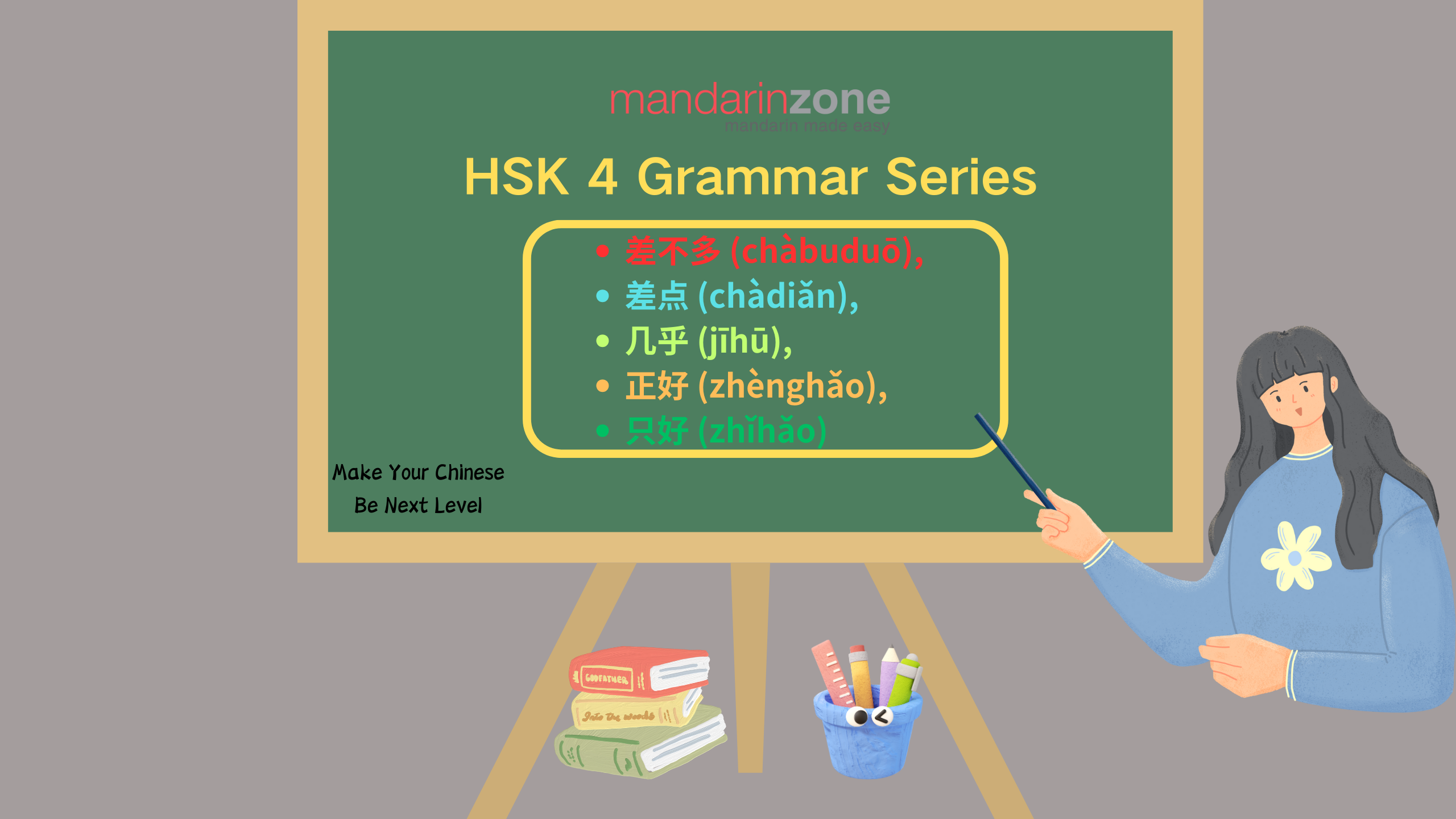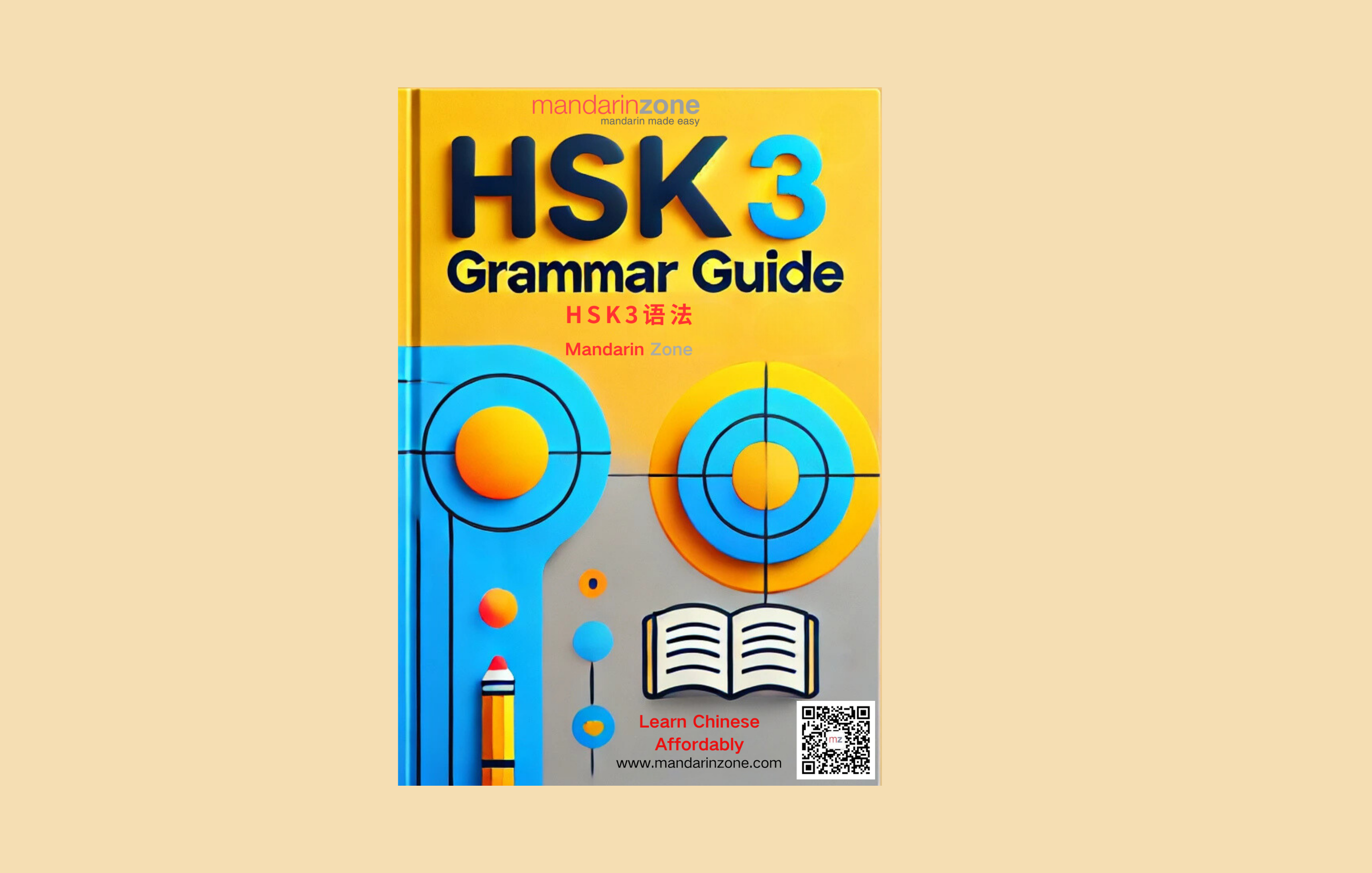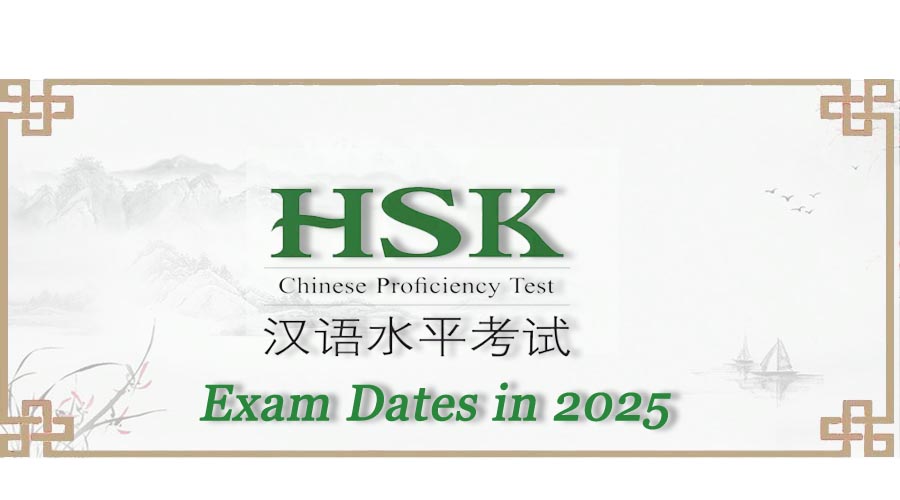HSK 5 Grammar Guide: 25 Most-Tested Grammar Patterns (2025)
Did you promised youself that pass HSK 5 in 2025? For learners preparing for the HSK 5 exam, mastering HSK 5 grammar is a pivotal step toward achieving fluency in Chinese. HSK 5 introduces advanced sentence structures and nuanced expressions that not only enhance your communication skills but also reflect a deeper understanding of the language. In this guide, we will explore key grammar points, practical applications, and expert tips to help you excel.
Table of Contents
- 1. The Importance of HSK 5 Grammar Points
- 2. Basic HSK 5 Grammar Structures
- 3. Advanced HSK 5 Grammar Patterns
- 4. Complex Sentence Structures
- 5. Practical Applications of HSK 5 Grammar Points
- 6. FAQs About HSK 5 Grammar
- 7. Conclusion: Take Your HSK 5 Grammar to the Next Level
- 8. More HSK 5 Exam Useful Articles
- 9. Online Grammar Exercise For This Article
The Importance of HSK 5 Grammar Points
HSK 5 grammar serves as the bridge between intermediate and advanced proficiency in Chinese. Unlike the foundational grammar in lower levels, this stage emphasizes formal structures, comparative expressions, and sentence patterns that convey sophisticated ideas. For instance, mastering patterns like “不但不…反而…” or “与其…不如…” enables learners to articulate contrasting ideas with precision.
Beyond exams, HSK 5 grammar is essential for effective communication in academic and professional settings. Understanding these structures equips learners to read Chinese texts more accurately, write cohesively, and engage in meaningful conversations.
Pass HSK With Expert Now!
Basic HSK 5 Grammar Structures
HSK 5 grammar encompasses a wide range of structures, from functional particles to complex sentences. Below, we delve into the most essential grammar points you need to master.
Functional Particles and Prepositions
所 (suǒ)
This versatile word functions as both an auxiliary and a measure word, serving multiple grammatical purposes. It reflects the Chinese language’s capability for abstraction and precise description of actions and events.
Key Usages of 所 (suǒ)
| Function | Explanation | Example (Chinese) | Example (Pinyin) | Example (English) |
|---|---|---|---|---|
| Nominalization | Turns a verb into a noun phrase, e.g., “to help” → “the act of helping.” | 我理解你所说的。 | Wǒ lǐjiě nǐ suǒ shuō de. | I understand what you said. |
| 他所做的一切都很出色。 | Tā suǒ zuò de yīqiè dōu hěn chūsè. | Everything he did was excellent. | ||
| Passive Voice | Indicates that the subject receives the action, often seen in formal contexts. | 这篇文章被很多人所阅读。 | Zhè piān wénzhāng bèi hěnduō rén suǒ yuèdú. | This article is read by many people. |
| 新政策为社会所接受。 | Xīn zhèngcè wéi shèhuì suǒ jiēshòu. | The new policy is accepted by society. |
Understanding the Depth of 所 (suǒ)
- Logical Function:
“所” serves as a nominalization tool, which abstracts a specific action into a concept. For example:- “你所说的” roughly translates to “the things you said,” making the verb “说” into an object of thought.
- This abstraction allows Chinese speakers to focus on the action itself rather than its direct performance, showing a sophisticated way of expressing ideas.
- Cultural Perspective:
In formal or written Chinese, the frequent use of “所” reflects the language’s emphasis on elegance and abstraction. It conveys a tone of objectivity and sophistication, resonating with the Chinese cultural tendency toward nuanced expression. - Historical Evolution:
Historically, “所” originated as a locative word in Classical Chinese, as seen in phrases like “吾所至之地” (the places I arrived at). Over time, its function evolved, gaining abstract grammatical roles, which are now predominant in Modern Chinese.
Nominalization Structure
所 + Verb + 的: Creates a phrase that acts as the subject or object of a sentence.
| Chinese | Pinyin | English |
|---|---|---|
| 我们应该关注学生所需要的。 | Wǒmen yīnggāi guānzhù xuésheng suǒ xūyào de. | We should pay attention to what students need. |
于 (yú)
This preposition is one of the most versatile in the Chinese language, commonly used in formal settings. Its primary functions include marking time, location, object, starting points, and comparisons. However, its true depth lies in its ability to encapsulate nuanced relationships in just one word.
Key Usages of 于 (yú)
| Function | Explanation | Example (Chinese) | Example (Pinyin) | Example (English) |
|---|---|---|---|---|
| Time | Indicates when something happens. Often translates as “in,” “on,” or “at.” | 中华人民共和国成立于1949年。 | Zhōnghuá Rénmín Gònghéguó chénglì yú 1949 nián. | The People’s Republic of China was established in 1949. |
| 我将于明天出发。 | Wǒ jiāng yú míngtiān chūfā. | I will depart tomorrow. | ||
| Location | Specifies where something occurs, similar to “in,” “at,” or “on.” | 会议将于北京举行。 | Huìyì jiāng yú Běijīng jǔxíng. | The conference will be held in Beijing. |
| Comparison | Compares two things, often translated as “than.” | 这个房间远大于我的房间。 | Zhè ge fángjiān yuǎn dà yú wǒ de fángjiān. | This room is much larger than my room. |
Understanding the Depth of 于 (yú)
- Semantic Flexibility:
Unlike English prepositions, which often have fixed meanings, “于” adapts to different contexts seamlessly. It connects ideas in terms of time, space, and logic, making it a powerful tool for concise expression. - Thinking in Relations:
The use of “于” demonstrates the Chinese language’s relational thinking. For instance:- “会议将于北京举行” emphasizes not just the location (Beijing) but also its relation to the event, creating an integrated narrative.
- “远大于” succinctly expresses comparison, a task that would require additional words in English.
- Historical Context:
Originating in Classical Chinese, “于” was once part of everyday language, such as in “居于陋巷” (living in a shabby alley). Over time, it evolved into a more formal preposition, highlighting its roots in ancient traditions while adapting to modern linguistic needs.
Practical Tips
- Practice using 所 (suǒ) and 于 (yú) in structured exercises.
- Observe their differences in formal vs. informal usage.
- Example:
- Formal: 我理解你所说的。 (I understand what you said.)
- Informal: 我听懂你刚才说的了。 (I got what you just said.)
- Insight: “所” adds a layer of abstraction and elegance, suitable for formal contexts.
- Example:
- Explore their roles in idiomatic expressions or set phrases, which often carry cultural or historical significance.
By integrating these linguistic and cultural insights, you can deepen your understanding of the subtle yet powerful ways in which “所” and “于” shape Chinese expression. These particles not only serve grammatical functions but also reflect the language’s inherent focus on relationships, abstraction, and elegance.
Advanced HSK 5 Grammar Patterns
Advanced Adverbs and Their Nuances
Adverbs play a critical role in HSK 5 grammar, often adding layers of meaning to sentences. Below, we delve into nuanced differences between commonly used adverbs, helping learners grasp their precise usage.
Time and Manner Adverbs
Adverbs such as 突然 (tūrán) and 忽然 (hūrán), as well as 一直 (yīzhí) and 始终 (shǐzhōng), play a significant role in expressing temporal nuances and continuity in Chinese. While they may appear similar, each carries subtle distinctions in tone, grammatical usage, and contextual application.
Suddenness: 突然 (tūrán) vs 忽然 (hūrán)
Both 突然 and 忽然 translate to “suddenly” but differ in their tone and grammatical roles. Understanding these differences can enhance the precision of your expressions.
突然 is commonly used as an adverb or adjective to describe an unexpected event or change that occurs abruptly. It often conveys a sense of surprise or shock.
忽然 also functions as an adverb but tends to carry a slightly softer tone. It is often used in literary contexts or to describe a sudden realization or change that may not be as jarring as that indicated by 突然.
Key Differences Between 突然 (tūrán) and 忽然 (hūrán)
| Word | Emphasis | Grammatical Role | Contextual Usage |
|---|---|---|---|
| 突然 (tūrán) | Sharp, unexpected, often dramatic change | Adverb (before verb), Adjective (describing noun) | Accidents, surprises, breaking news, sudden changes in emotion. |
| 忽然 (hūrán) | Spontaneous, somewhat unexpected appearance or realization | Primarily an adverb (before verb) | Thoughts, ideas, noticing something, weather changes. |
Examples
| Example (Chinese) | Pinyin | English | Analysis |
|---|---|---|---|
| 突然 事情突然发生了。 | Shìqíng tūrán fāshēngle. | The matter suddenly happened. | Describes an abrupt, dramatic event. |
| 突然 这是一起突然的事故。 | Zhè shì yīqǐ tūrán de shìgù. | This is a sudden accident. | Functions as an adjective to modify “accident.” |
| 忽然 我忽然明白了。 | Wǒ hūrán míngbáile. | I suddenly understood. | Describes a spontaneous realization. |
Idiomatic Expressions
| Phrase | Pinyin | Meaning |
|---|---|---|
| 突然 突然袭击 | Tūrán xíjī | Sudden attack (literal or figurative). |
| 突然 突然之间 | Tūrán zhī jiān | All of a sudden. |
| 忽然 忽然醒悟 | Hūrán xǐngwù | Suddenly realize, come to one’s senses. |
| 忽然 忽然不见 | Hūrán bùjiàn | Suddenly disappear. |
Tip: Use 突然 for formal or dramatic contexts, while 忽然 is better suited for casual or descriptive narration.
Continuity: 一直 (yīzhí) vs 始终 (shǐzhōng)
While both 一直 and 始终 express continuity, their focus and usage differ. 一直 emphasizes uninterrupted action over time, while 始终 highlights persistence with a sense of determination.
Key Differences Between 一直 (yīzhí) and 始终 (shǐzhōng)
| Word | Emphasis | Contextual Usage |
|---|---|---|
| 一直 (yīzhí) | Uninterrupted duration, consistent action over time | Habits, ongoing situations, actions done without a break. |
| 始终 (shǐzhōng) | Unwavering persistence from start to finish, despite difficulties | Beliefs, principles, attitudes, long-term projects. |
Examples
| Example (Chinese) | Pinyin | English & Analysis |
|---|---|---|
| 一直 我们一直画到凌晨三点。 | Wǒmen yīzhí huà dào língchén sāndiǎn. | We kept drawing until 3 a.m. Indicates continuous action over time. |
| 始终 我们始终坚持正确的做法。 | Wǒmen shǐzhōng jiānchí zhèngquè de zuòfǎ. | We have always adhered to the correct approach. Emphasizes persistence in adhering to principles. |
Idiomatic Expressions
| Phrase | Pinyin | Meaning |
|---|---|---|
| 始终 始终如一 | Shǐzhōng rúyī | Consistent from beginning to end. |
| 始终 始终不渝 | Shǐzhōng bù yú | Unwavering, steadfast. |
Tip:
- Use 一直 for flexibility across past, present, and future actions.
- Use 始终 to emphasize long-term determination and consistency, especially in formal expressions.
Practical Insights
Misconception: 一直 and 始终 Are Always Interchangeable
While they both convey continuity, 始终 implies greater determination and resilience, often used in formal contexts.
- Example:
- “我一直学习” → “I’ve been studying continuously.”
- “我始终坚持学习” → “I’ve persisted in my studies despite challenges.”
Cultural Perspective
- 突然 vs 忽然: The sharper tone of 突然 aligns with dramatic or impactful events, reflecting a formal or urgent tone. In contrast, 忽然 often fits softer, introspective moments, resonating with personal thoughts or weather descriptions.
- 一直 vs 始终: The formal tone of 始终 reflects the Chinese cultural emphasis on persistence and consistency, values often highlighted in traditional stories and idioms.
Practical Tips for Mastery
- Distinguish Contexts:
Use 突然 for dramatic, unexpected changes and 忽然 for spontaneous realizations or soft narrative shifts. - Highlight Continuity:
Apply 一直 for general, ongoing actions and 始终 for formal or determined persistence. - Practice Idiomatic Usage:
Incorporate idioms like 始终如一 or 突然之间 to enhance fluency and deepen your understanding of cultural connotations.
By mastering these adverbs, you will gain precision in expressing time and continuity, allowing for more nuanced communication in both casual and formal contexts.
Expressing Luck and Urgency: 多亏 (duōkuī) vs 幸亏 (xìngkuī)
Both 多亏 and 幸亏 are essential adverbs in Chinese, commonly used to express gratitude or relief. They may seem similar at first glance, but their nuanced differences in tone, structure, and emphasis make them unique.
Key Differences Between 多亏 (duōkuī) and 幸亏 (xìngkuī)
| Word | Meaning | Emphasis | Common Usage |
|---|---|---|---|
| 多亏 duōkuī |
Thanks to, owing to |
Gratitude for someone’s help or a favorable situation that prevented a negative outcome. | Acknowledging the positive role of a person or event. |
| 幸亏 xìngkuī |
Fortunately, luckily |
Relief that a bad outcome was avoided or a fortunate event occurred. | Highlighting good fortune or relief in avoiding problems. |
Examples
| Example (Chinese) | Pinyin | English & Analysis |
|---|---|---|
| 多亏 你帮我,我才能按时完成作业。 | Duōkuī nǐ bāng wǒ, wǒ cái néng ànshí wánchéng zuòyè. | Thanks to your help, I was able to complete my homework on time. Shows gratitude for specific help received. |
| 幸亏 我带了伞,否则就淋湿了。 | Xìngkuī wǒ dàile sǎn, fǒuzé jiù línshī le. | Fortunately, I brought an umbrella, otherwise I would have gotten wet. Expresses relief at avoiding an unpleasant situation. |
Grammatical Usage
- 多亏 (duōkuī):
- Always followed by a noun or noun phrase representing the person or thing you’re grateful for.
- Example:
- 多亏你的帮助,我们按时完成了工作。
(Duōkuī nǐ de bāngzhù, wǒmen ànshí wánchéngle gōngzuò.)
(Thanks to your help, we finished the work on time.)
- 多亏你的帮助,我们按时完成了工作。
- 幸亏 (xìngkuī):
- Usually followed by a clause describing the fortunate event or avoided situation.
- Example:
- 幸亏下雨了,不然农作物都会干死。
(Xìngkuī xiàyǔ le, bùrán nóngzuòwù dōu huì gānsǐ.)
(Fortunately, it rained, or the crops would have dried out.)
- 幸亏下雨了,不然农作物都会干死。
Practical Comparison
| Scenario | 多亏 (duōkuī) |
幸亏 (xìngkuī) |
|---|---|---|
| Expressing gratitude to someone |
多亏他提醒我,我才没有迟到。
Thanks to his reminder, I wasn’t late.
|
Not applicable.
|
| Expressing relief about an event |
多亏天气预报准确,我们才没有淋雨。
Thanks to the accurate weather forecast, we didn’t get wet.
|
幸亏我们带了伞,不然就淋雨了。
Fortunately, we brought an umbrella, or we would have gotten wet.
|
Key Differences
- 多亏 is used specifically to express gratitude towards someone or something that helped prevent a negative outcome.
- 幸亏 focuses more on the fortunate nature of a situation, without necessarily attributing it to someone’s help.
Cultural and Etymological Insights
- Etymology of “亏 (kuī)”:
The character “亏” originally carried a meaning of “loss” or “deficiency.” Its evolution in phrases like 多亏 and 幸亏 reflects a shift in connotation from “a loss avoided” to “a fortunate outcome.” This ironic undertone likely stems from expressions of understatement, e.g., “Oh, I only lost this much—what luck!” - Cultural Context:
- 多亏 emphasizes interpersonal gratitude and is often used to thank someone directly for their role in achieving a positive outcome.
- 幸亏 highlights external circumstances and is more introspective, focusing on relief about events outside one’s control.
Idiomatic Examples
| Expression | Pinyin | English Translation |
|---|---|---|
| 多亏 多亏大家的努力,这次活动很成功。 | Duōkuī dàjiā de nǔlì, zhè cì huódòng hěn chénggōng. | Thanks to everyone’s effort, the event was a success. |
| 幸亏 幸亏司机反应快,我们才避免了事故。 | Xìngkuī sījī fǎnyìng kuài, wǒmen cái bìmiǎnle shìgù. | Fortunately, the driver reacted quickly, and we avoided an accident. |
Tips for Mastery
- Focus on the Subject:
- Use 多亏 to thank a person or specific action.
- Use 幸亏 to highlight relief about circumstances.
- Pair Correctly:
- 多亏 + Noun/Noun Phrase
- 幸亏 + Clause
- Understand the Tone:
- 多亏: Gratitude-driven, interpersonal.
- 幸亏: Relief-driven, external or circumstantial.
By mastering the subtle differences between 多亏 and 幸亏, you’ll gain a richer ability to express gratitude and relief in nuanced, context-appropriate ways.
-
- 连忙: 他听到名字被叫到,连忙站起来回答。
(He heard his name called and promptly stood up to answer.) - 急忙: 考试时间快结束了,他急忙写完最后一题。
(The exam time was almost over, so he hurriedly finished the last question.) - 匆忙: 他匆忙交卷,没有检查答案。
(He submitted the paper in a rush without checking the answers.)
- 连忙: 他听到名字被叫到,连忙站起来回答。
- Understand the Emotional Tone:
- 连忙 often conveys calm and proactive haste.
- 急忙 suggests pressure or slight panic.
- 匆忙 highlights haste at the expense of quality or preparedness.
Conclusion
By mastering 连忙, 急忙, and 匆忙, learners can navigate various scenarios that require expressions of haste or urgency. These words not only enhance linguistic precision but also reflect important cultural values and contextual subtleties in Chinese communication.
Complex Sentence Structures
HSK 5 introduces complex sentence structures that are crucial for expressing nuanced ideas and logical relationships. These patterns are common in written and spoken Chinese, making them essential for learners aiming for fluency.
Key Sentence Patterns: 不但不/没有…反而… and 宁可…也不/也要…
These sentence patterns are powerful tools for expressing unexpected outcomes and preferences in Chinese. By mastering these structures, learners can add depth and nuance to their expressions, especially in argumentative or descriptive contexts.
1. 不但不/没有…反而… (búdàn bù/méiyǒu… fǎn’ér…)
This pattern emphasizes an unexpected or contrasting result, contrary to the speaker’s expectations. It works by setting up an expectation with 不但不/没有, only to subvert it with 反而 (“on the contrary” or “but rather”).
Key Differences: 不 vs 没有
| Word | Usage | Examples |
|---|---|---|
| 不 (bù) |
Negates qualities or ongoing actions. |
他不但不去看医生,反而坚持上班。
Tā bùdàn bù qù kàn yīshēng, fǎn’ér jiānchí shàngbān.
He not only doesn’t see a doctor but insists on working.
|
| 没有 (méiyǒu) |
Negates specific events, actions, or changes. |
他不但没有完成作业,反而玩了一整天。
Tā bùdàn méiyǒu wánchéng zuòyè, fǎn’ér wánle yī zhěng tiān.
He not only didn’t finish his homework but played all day.
|
| Pattern | Explanation |
|---|---|
| 不但…反而… | This pattern (not only… but rather…) is used to emphasize a contrast between two actions or situations, where the second part is often unexpected or goes against normal expectations. |
Comparison with 不但…而且…
- 不但…而且… adds complementary information.
- Example: 他不但聪明,而且努力。
(Tā bùdàn cōngmíng, érqiě nǔlì.)
(He is not only smart but also hardworking.)
- Example: 他不但聪明,而且努力。
- 不但不/没有…反而… introduces a twist or unexpected outcome.
- Example: 吃了这药,感冒不但没有好,反而更严重了。
(Chīle zhè yào, gǎnmào búdàn méiyǒu hǎo, fǎn’ér gèng yánzhòng le.)
(After taking this medicine, the cold not only didn’t improve but got worse.)
- Example: 吃了这药,感冒不但没有好,反而更严重了。
Practical Examples
| Scenario | Example (Chinese) | Pinyin | English |
|---|---|---|---|
| Health | 吃了药,感冒不但没有好,反而更严重了。 | Chīle yào, gǎnmào búdàn méiyǒu hǎo, fǎn’ér gèng yánzhòng le. | After taking the medicine, the cold not only didn’t improve but got worse. |
| Behavior | 他不但不听话,反而故意捣乱。 | Tā bùdàn bù tīnghuà, fǎn’ér gùyì dǎoluàn. | He not only doesn’t listen but deliberately causes trouble. |
| Work | 他不但没有帮助团队,反而增加了工作量。 | Tā bùdàn méiyǒu bāngzhù tuánduì, fǎn’ér zēngjiāle gōngzuò liàng. | He not only didn’t help the team but added to the workload. |
| Key Structure | Note |
|---|---|
| 不但/没有… 反而… | This structure emphasizes an unexpected or contrasting outcome. The second part (after 反而) often presents a situation that is worse than or opposite to what was expected. |
2. 宁可…也不/也要… (nìngkě… yěbù/yěyào…)
This structure expresses a preference between two options, often emphasizing an unfavorable or difficult choice.
Key Variants
| Variant | Usage | Examples |
|---|---|---|
| 宁可…也不… | Preference for one unfavorable choice over another. |
我宁可饿着,也不吃这种东西。
Wǒ nìngkě èzhe, yě bù chī zhè zhǒng dōngxī.
I would rather stay hungry than eat this.
|
| 宁可…也要… | Insistence on pursuing a goal despite challenges. |
小孩子宁可不睡觉,也要继续玩。
Xiǎoháizi nìngkě bù shuìjiào, yěyào jìxù wán.
The child would rather skip sleeping than stop playing.
|
| Structure Note | Usage Note |
|---|---|
| 宁可 A + 也不/也要 B | This pattern expresses a strong preference where:
|
Comparison with Similar Structures
- 宁愿 (nìngyuàn)…也不…
Slightly more formal than 宁可, but interchangeable in most contexts.- Example: 我宁愿走路,也不坐那种车。
(Wǒ nìngyuàn zǒulù, yě bù zuò nà zhǒng chē.)
(I would rather walk than take that kind of car.)
- Example: 我宁愿走路,也不坐那种车。
Practical Examples
| Scenario | Example (Chinese) | Pinyin | English |
|---|---|---|---|
| Personal Choice | 我宁可累一点,也要完成这个项目。 | Wǒ nìngkě lèi yīdiǎn, yěyào wánchéng zhège xiàngmù. | I would rather be a bit tired but finish this project. |
| Difficult Trade-off | 他宁可放弃高薪工作,也不想失去自由。 | Tā nìngkě fàngqì gāoxīn gōngzuò, yě bùxiǎng shīqù zìyóu. | He would rather give up a high-paying job than lose his freedom. |
| Context Analysis | Pattern Usage |
|---|---|
| Personal Choice Case | Uses 宁可…也要… to show determination to achieve a goal despite personal sacrifice |
| Trade-off Case | Uses 宁可…也不… to express choosing between two significant options, prioritizing personal values |
Tips for Mastery
- Understand Context:
- Use 不但不/没有…反而… to highlight unexpected outcomes or contrast in argumentative writing or storytelling.
- Use 宁可…也不/也要… to emphasize preferences in challenging or hypothetical scenarios.
- Practice with Hypotheticals:
- Create sentences comparing two options to get comfortable with 宁可…也不….
Example: 我宁可___,也不___。 (I would rather ___ than ___.) - Use 不但不/没有…反而… to describe surprising results.
Example: 他不但没有___,反而___。 (He not only didn’t ___ but ___.)
- Create sentences comparing two options to get comfortable with 宁可…也不….
- Incorporate Into Conversations:
- These patterns are especially useful in debates or persuasive speech. Practice building sentences to express strong preferences or unexpected observations.
By mastering 不但不/没有…反而… and 宁可…也不/也要…, learners can articulate complex ideas, contrasting outcomes, and nuanced preferences with confidence and precision.
Hypothetical and Conditional Sentences: 与其…不如… and 万一…(就)…
Hypothetical and conditional structures like 与其…不如… and 万一…(就)… play a crucial role in Chinese, allowing speakers to express preferences, compare alternatives, or prepare for contingencies. With added nuances in tone and probability, mastering these patterns helps learners achieve more sophisticated and culturally nuanced expressions.
1. 与其…不如… (yǔqí… bùrú…)
Core Meaning
The 与其…不如… structure emphasizes making a wise decision between two options. It often translates as “it’s better to… than to…” or “would rather… than…,” guiding the listener toward a more advantageous path.
Key Features
- Structure and Tone:
- 与其 A,不如 B
(Rather than A, it’s better to choose B.) - Can express rational judgment or, in some cases, irony or resignation.
- 与其 A,不如 B
- Common Usage:
- Frequently found in essays, debates, and classical literature, where it shapes a narrative or influences the reader’s perception.
- Cultural Significance:
- Reflects Chinese pragmatism, focusing on efficiency, practicality, and rational decision-making.
Examples
| Scenario | Example (Chinese) | Pinyin | English |
|---|---|---|---|
| Daily Decision | 与其坐火车,不如坐飞机更快。 | Yǔqí zuò huǒchē, bùrú zuò fēijī gèng kuài. | Rather than taking the train, it’s faster to fly. |
| Study Preferences | 与其死记硬背,不如理解内容更有效。 | Yǔqí sǐjì yìngbèi, bùrú lǐjiě nèiróng gèng yǒuxiào. | Rather than rote memorization, it’s more effective to understand the material. |
| Health Choices | 与其吃快餐,不如自己做饭更健康。 | Yǔqí chī kuàicān, bùrú zìjǐ zuòfàn gèng jiànkāng. | Rather than eating fast food, it’s healthier to cook at home. |
| Element | Function |
|---|---|
| 与其 + Option A | Introduces the less preferred option or current situation |
| 不如 + Option B + 更… | Presents the better alternative, often with a comparative adjective (更快, 更有效, 更健康) |
Advanced Usage in Literature
- Irony and Resignation:
- 与其抱怨命运,不如面对现实。
(Yǔqí bàoyuàn mìngyùn, bùrú miànduì xiànshí.)
(Rather than complaining about fate, it’s better to face reality.) - Often found in classical prose or poetry to convey a reluctant compromise or lament.
- 与其抱怨命运,不如面对现实。
- Guiding the Reader:
- 与其犹豫不决,不如果断行动。
(Yǔqí yóuyù bù jué, bùrú guǒduàn xíngdòng.)
(Rather than hesitating, it’s better to take decisive action.) - Subtly shapes the narrative or reinforces the author’s argument.
- 与其犹豫不决,不如果断行动。
Comparison with Similar Structures
| Structure | Purpose | Example |
|---|---|---|
| 与其…不如… | Compares two options, favoring the second. |
与其熬夜加班,不如合理安排时间。
Yǔqí áoyè jiābān, bùrú hélǐ ānpái shíjiān.
Rather than staying up late for work, it’s better to manage your time effectively.
|
| 宁可…也不… | Emphasizes a preference even in unfavorable choices. |
宁可晚到,也不冒险开快车。
Nìngkě wǎn dào, yě bù màoxiǎn kāi kuài chē.
I’d rather be late than risk driving too fast.
|
| Pattern | Usage Notes |
|---|---|
| 与其…不如… | – Often used for practical suggestions – Second option usually includes a comparative adjective (更好, 更快, etc.) – More neutral and objective in tone |
| 宁可…也不… | – Expresses strong personal preference – Often involves choosing between two less-than-ideal options – More subjective and emotional in tone |
2. 万一…(就)… (wànyī… jiù…)
Core Meaning
The 万一…(就)… structure introduces a low-probability hypothetical event and its consequence, emphasizing precaution and preparedness. It translates as “just in case…” or “if by any chance… then…”.
Key Features
- Structure and Tone:
- 万一 + Hypothetical Condition + (就)+ Consequence
(In case A happens, then B should follow.) - Indicates a “Plan B” mindset, balancing readiness with an understanding that the event is unlikely.
- 万一 + Hypothetical Condition + (就)+ Consequence
- Cultural Insight:
- Reflects the Chinese value of being prepared for the unexpected, emphasizing caution and adaptability.
Examples
| Scenario | Example (Chinese) | Pinyin | English |
|---|---|---|---|
| Safety Measures | 万一着火,就从安全出口撤离。 | Wànyī zháohuǒ, jiù cóng ānquán chūkǒu chèlí. | In case of fire, evacuate through the safety exit. |
| Everyday Planning | 万一手机没电了,就用我的充电宝。 | Wànyī shǒujī méi diàn le, jiù yòng wǒ de chōngdiànbǎo. | In case your phone runs out of power, use my power bank. |
| Travel Contingencies | 万一飞机晚点,我们就改乘火车。 | Wànyī fēijī wǎndiǎn, wǒmen jiù gǎi chéng huǒchē. | If the plane is delayed, we’ll switch to taking the train. |
| Structure | Usage Notes |
|---|---|
| 万一 + Situation + 就 + Solution | – 万一 introduces a hypothetical situation – 就 introduces the planned response or solution – Used for both serious situations (safety) and daily contingencies |
| Common Contexts | – Emergency planning – Backup arrangements – Precautionary measures |
Nuanced Use of 就
- Emphasizing Immediacy:
- 万一明天下雨,我们就取消野餐。
(Wànyī míngtiān xiàyǔ, wǒmen jiù qǔxiāo yěcān.)
(If it rains tomorrow, we’ll cancel the picnic.) - 就 emphasizes the direct result.
- 万一明天下雨,我们就取消野餐。
- Optional Use:
- 万一你找不到他,(就)给我打电话。
(Wànyī nǐ zhǎo bù dào tā, (jiù) gěi wǒ dǎ diànhuà.)
(In case you can’t find him, call me.) - Omitting 就 keeps the sentence neutral but still conveys the meaning.
- 万一你找不到他,(就)给我打电话。
Comparison of Hypothetical Conditionals
| Word | Implied Probability | Example |
|---|---|---|
| 如果 (rúguǒ) |
Neutral, general “if” |
如果你有时间,我们就去看电影。
Rúguǒ nǐ yǒu shíjiān, wǒmen jiù qù kàn diànyǐng.
If you have time, we’ll go watch a movie.
|
| 要是 (yàoshi) |
Similar to 如果, slightly colloquial |
要是下雨,我们就待在家里。
Yàoshi xià yǔ, wǒmen jiù dāi zài jiā lǐ.
If it rains, we’ll stay at home.
|
| 万一 (wànyī) |
Low probability, “just in case” |
万一他忘了带钥匙,你就给他开门。
Wànyī tā wàngle dài yàoshi, nǐ jiù gěi tā kāimén.
Just in case he forgets his key, you open the door.
|
| Word | Usage Notes |
|---|---|
| 如果 (rúguǒ) | – Most formal and commonly used – Suitable for both written and spoken Chinese – Often used in academic or professional contexts |
| 要是 (yàoshi) | – More casual and conversational – Common in everyday speech – Often used in informal situations |
| 万一 (wànyī) | – Used for unlikely or unexpected situations – Often implies preparation for emergencies – Frequently used in contingency planning |
Cultural and Regional Insights
- Regional Variations:
- In some southern dialects, 就 may be used more frequently for emphasis, even when it’s optional in standard Mandarin.
- Contextual Nuances:
- Including 就 conveys urgency or emotional weight. Omitting it creates a softer, less direct tone.
Practical Application
- Use Cases for 与其…不如…:
- Persuasive Essays: 比较选择与其…不如…提出最优解。
- Narrative Writing: 描述角色选择时,传递理性或讽刺情绪。
- Use Cases for 万一…(就)…:
- Emergency Planning: 制定应急方案。
- Casual Conversations: 讨论低概率可能性,准备应对计划。
Conclusion
By integrating 与其…不如… and 万一…(就)… into their repertoire, learners can express complex comparisons and prepare for hypothetical situations with cultural and grammatical precision. These structures not only enhance fluency but also deepen understanding of Chinese pragmatism and adaptability, key to mastering the language.
Other Complex Sentence Patterns
Complex sentence patterns like 幸亏…不然…, 除非…不然…, and 哪怕…也/还… add depth to Chinese expressions, allowing speakers to articulate conditions, persistence, and hypothetical scenarios with precision and emotional nuance.
1. 幸亏…不然… (xìngkuī… bùrán…)
Core Function
This structure emphasizes a fortunate event or decision that prevented a negative outcome. It translates as “fortunately… otherwise…” or “luckily… or else…”.
Key Features
- Structure:
- 幸亏 + Fortunate Condition + 不然 + Negative Consequence
(Fortunately A happened, otherwise B would have occurred.)
- 幸亏 + Fortunate Condition + 不然 + Negative Consequence
- Tone:
- Highlights relief and gratitude for avoiding an undesirable result.
- Common Usage:
- Frequently used in daily conversations and storytelling to express close calls or positive outcomes.
Example
| Scenario | Example (Chinese) | Pinyin | English |
|---|---|---|---|
| Weather | 幸亏今天带了伞,不然早就淋湿了。 | Xìngkuī jīntiān dàile sǎn, bùrán zǎo jiù línshī le. | Fortunately, I brought an umbrella today, or I would have gotten soaked. |
| Travel | 幸亏我们提前订了票,不然现在就没位置了。 | Xìngkuī wǒmen tíqián dìngle piào, bùrán xiànzài jiù méi wèizhì le. | Luckily, we booked tickets early, or there wouldn’t be any seats left now. |
| Structure | Usage Notes |
|---|---|
| 幸亏 + Positive Action + 不然 + Negative Consequence | – 幸亏 introduces a fortunate action or situation – 不然 introduces what would have happened otherwise – Often used to express relief about avoiding an undesirable outcome |
| Common Applications | – Expressing relief about preparations made – Acknowledging good fortune in timing – Reflecting on avoided problems |
Tips for Usage
- Use 幸亏 to emphasize the positive factor, and pair it with 不然 to underline the potential negative result.
- Suitable for both formal and casual contexts.
2. 除非…不然… (chúfēi… bùrán…)
Core Function
This pattern indicates a unique or strict condition required to avoid a certain consequence. It translates as “unless… otherwise…”.
Key Features
- Structure:
- 除非 + Condition + 不然 + Result
(Unless A happens, otherwise B will happen.)
- 除非 + Condition + 不然 + Result
- Tone:
- Used to emphasize a non-negotiable condition.
- Common Usage:
- Often seen in formal or persuasive contexts, as well as personal negotiations.
Example
| Scenario | Example (Chinese) | Pinyin | English |
|---|---|---|---|
| Invitation | 除非他邀请我,不然我不会去。 | Chúfēi tā yāoqǐng wǒ, bùrán wǒ bú huì qù. | Unless he invites me, I won’t go. |
| Decision | 除非公司给出更好的条件,不然我不会接受这份工作。 | Chúfēi gōngsī gěichū gèng hǎo de tiáojiàn, bùrán wǒ bú huì jiēshòu zhè fèn gōngzuò. | Unless the company offers better terms, I won’t accept the job. |
| Structure | Usage Notes |
|---|---|
| 除非 + Condition + 不然 + Negative Result | – 除非 introduces the only condition that would change the outcome – 不然 connects to the default negative result – Often used with negatives (不会, 不能, etc.) in the result clause |
| Common Contexts | – Setting conditions for agreement – Making personal boundaries clear – Expressing firm decisions with specific conditions for change |
Tips for Usage
- 除非…不然… is effective for expressing strong positions or setting boundaries in arguments or discussions.
- It often implies a sense of inevitability in the result if the condition isn’t met.
3. 哪怕…也/还… (nǎpà… yě/hái…)
Core Function
This pattern conveys persistence or determination in the face of unfavorable conditions. It translates as “even if… still…” or “no matter… will still…”.
Key Features
- Structure:
- 哪怕 + Adverse Condition + 也/还 + Action/Result
(Even if A happens, B will still occur.)
- 哪怕 + Adverse Condition + 也/还 + Action/Result
- Tone:
- Demonstrates resilience or a strong will.
- Common Usage:
- Frequently used in motivational contexts, literature, and personal affirmations.
Example
| Scenario | Example (Chinese) | Pinyin | English |
|---|---|---|---|
| Performance | 哪怕只有一个观众,她也会继续表演。 | Nǎpà zhǐ yǒu yí gè guānzhòng, tā yě huì jìxù biǎoyǎn. | Even if there’s only one audience member, she will still perform. |
| Commitment | 哪怕再困难,我还会坚持完成任务。 | Nǎpà zài kùnnán, wǒ hái huì jiānchí wánchéng rènwù. | No matter how difficult it gets, I will still persevere to complete the task. |
| Structure | Usage Notes |
|---|---|
| 哪怕 + Extreme Condition + 也/还 + Determined Action | – 哪怕 introduces an extreme or unlikely situation – 也/还 emphasizes the speaker’s determination – Often used to show strong resolve or commitment |
| Common Uses | – Expressing determination despite challenges – Showing commitment in difficult situations – Emphasizing perseverance under extreme conditions |
Tips for Usage
- 哪怕 is powerful for motivational statements, expressing determination against odds.
- 也 and 还 can often be interchanged, though 还 carries a slightly stronger tone of persistence.
Comparison of Patterns
| Pattern | Purpose | Example |
|---|---|---|
| 幸亏…不然… | Highlights relief at avoiding a negative outcome. |
幸亏带了伞,不然就淋湿了。
Xìngkuī dàile sǎn, bùrán jiù línshī le.
Fortunately, I brought an umbrella, or I’d be soaked.
|
| 除非…不然… | Emphasizes a strict condition. |
除非他答应,不然我们不会改变计划。
Chúfēi tā dāying, bùrán wǒmen bú huì gǎibiàn jìhuà.
Unless he agrees, we won’t change the plan.
|
| 哪怕…也/还… | Shows determination or persistence. |
哪怕再忙,我也会抽时间锻炼。
Nǎpà zài máng, wǒ yě huì chōu shíjiān duànliàn.
No matter how busy I am, I’ll still make time to exercise.
|
| Pattern Type | Key Features |
|---|---|
| Relief Pattern (幸亏…不然…) |
– Expresses gratitude for a fortunate situation – Contrasts with a potential negative outcome – Often used for past events |
| Conditional Pattern (除非…不然…) |
– Sets clear conditions for change – Usually involves a negative result clause – Used for firm positions or decisions |
| Persistence Pattern (哪怕…也/还…) |
– Emphasizes commitment despite obstacles – Often uses 也 or 还 in the result clause – Expresses strong determination |
Cultural and Practical Insights
- 幸亏…不然…:
- Reflects a common conversational tone, often used to share personal anecdotes or near misses.
- 除非…不然…:
- Highlights the importance of specific conditions, resonating with a negotiation or assertive tone.
- 哪怕…也/还…:
- Demonstrates the cultural value of perseverance, often found in motivational language and literature.
Practice Suggestions
- Create Your Own Sentences:
- Write examples from daily life using these patterns.
- Example: 幸亏___,不然___。 (Fortunately ___, otherwise ___.)
- Example: 除非___,不然___。 (Unless ___, otherwise ___.)
- Example: 哪怕___,也___。 (Even if ___, still ___.)
- Write examples from daily life using these patterns.
- Compare and Contrast:
- Practice distinguishing these patterns by creating sentences that highlight different tones and purposes.
- Tip: This structure is useful for showing strong resolve or commitment.
Practical Applications of HSK 5 Grammar Points
Mastering grammar is not just about understanding rules—it’s about using them effectively in real-life situations. Below are practical scenarios and strategies to apply HSK 5 grammar in meaningful ways.
Real-life Scenarios
- Business Context:In professional settings, grammar structures like passive voice (“为…所…”) and formal expressions (“令”) are invaluable.
- Example (Passive Voice): 他的工作表现为公司所认可。
(Tā de gōngzuò biǎoxiàn wèi gōngsī suǒ rènkě.)
(His performance is recognized by the company.) - Example (令): 经理的表扬令我非常感动。
(Jīnglǐ de biǎoyáng lìng wǒ fēicháng gǎndòng.)
(The manager’s praise made me deeply moved.)
Tip: Practice these sentence structures in mock business conversations or emails to build confidence.
- Example (Passive Voice): 他的工作表现为公司所认可。
- Travel and Daily Life:Comparisons (“不如”) and direction words (“朝”) are commonly used in travel-related conversations.
- Example (Comparison): 北京的天气不如上海那么潮湿。
(Běijīng de tiānqì bùrú Shànghǎi nàme cháoshī.)
(Beijing’s weather is not as humid as Shanghai’s.) - Example (Direction): 你朝左走,就能看到那家餐厅。
(Nǐ cháo zuǒ zǒu, jiù néng kàn dào nà jiā cāntīng.)
(Turn left, and you’ll see the restaurant.)
Tip: Use these structures in travel-related role-playing exercises to prepare for practical use.
- Example (Comparison): 北京的天气不如上海那么潮湿。
Connecting Grammar to Culture
- Understanding Politeness and Hierarchy:In Chinese, certain grammar points reflect cultural values. For instance:
- “令” highlights authority or respect.
- “为…所…” adds a sense of formality.
Example: 他为所有学生所尊敬。
(Tā wèi suǒyǒu xuéshēng suǒ zūnjìng.)
(He is respected by all the students.) - Idiomatic Usage:Many HSK 5 grammar patterns appear in idioms or set phrases. For example:
- 与其坐等,不如主动出击。
(Yǔqí zuòděng, bùrú zhǔdòng chūjī.)
(Instead of waiting passively, it’s better to take the initiative.)
Tip: Learn idiomatic expressions alongside grammar to gain deeper cultural insights.
- 与其坐等,不如主动出击。
Study Strategies
- Interactive Exercises:Use flashcards or apps like Quizlet to drill grammar points with contextual examples.
- Language Immersion:Watch Chinese dramas or listen to podcasts that feature complex sentence patterns. Pause and mimic sentences that use HSK 5 grammar structures.Example: 在电视剧中,注意对“突然”和“忽然”的使用方式。
—
FAQs About HSK 5 Grammar
To address common challenges and concerns, here are answers to frequently asked questions about HSK 5 grammar:
1. Why is HSK 5 grammar harder than HSK 4?
HSK 5 grammar introduces formal structures and complex sentence patterns, such as passive voice (“为…所…”) and contrasting sentences (“不但不…反而…” ). These require learners to think more critically about context and relationships between ideas.
2. How can I master HSK 5 grammar efficiently?
Follow these steps:
- Break Down Grammar: Focus on one structure at a time, such as pivotal sentences with “令.”
- Practice Daily: Write sentences using the target grammar and get feedback from native speakers or language partners.
- Leverage Resources: Use apps, grammar books, and online videos tailored for HSK 5 learners.
3. Are there common mistakes to avoid?
Yes, some frequent errors include:
- Using the wrong preposition (“朝” instead of “向”).
- Confusing informal and formal expressions (“就” vs. “便”).
Tip: Review examples in authentic materials, such as news articles or essays, to understand the nuances.
4. What resources are best for mastering HSK 5 grammar?
- Books: *HSK Standard Course Level 5* and *Modern Chinese Grammar: A Clause-Pivot Approach*.
- Websites: Platforms like DigMandarin and Mandarin HQ provide structured lessons and exercises.
- Apps: Pleco for dictionary and grammar explanations, DuChinese for reading practice.
5. How much grammar do I need to memorize for the HSK 5 exam?
There are 71 HSK 5 grammar points. But you can focus on the core structures mentioned in this guide. Ensure you can recognize and use them in reading and writing tasks. Prioritize high-frequency patterns like “不但不…反而…” and “宁可…也不…” for better exam performance.
All Official HSK 5 Grammar Points
Conclusion: Take Your HSK 5 Grammar to the Next Level
Mastering HSK 5 grammar is a journey that bridges the gap between intermediate and advanced Chinese proficiency. By understanding and practicing key sentence patterns like passive voice (“为…所…”), pivotal sentences (“令”), and complex conditional structures (“与其…不如…”), you not only prepare for the HSK 5 exam but also develop the skills needed for fluent and natural communication.
Remember, consistent practice and application are the keys to success. Whether you’re studying through flashcards, immersing yourself in Chinese media, or engaging in structured exercises, the effort you invest will pay off in your reading, writing, speaking, and listening skills. With determination and the right strategies, you’ll unlock the full potential of HSK 5 grammar and make significant strides in your Chinese learning journey.
If you’re ready to take the next step, explore our courses and resources designed specifically for HSK learners, or connect with fellow students for peer support. Your path to mastery starts here!
More HSK 5 Exam Useful Articles
Free HSK 5 Grammar Online Quiz
HSK Level 5-All You Need To Know About HSK 5
HSK 5 Vocabulary List + Excel (with 3 Free Quiz Sheets)
Official HSK Scoring System and Passing Scores Explained – 2025
Learn Chinese in 2025: Unlock Global Success and Career Opportunities
Free HSK 6 Grammar Online Quiz
Online Grammar Exercise For This Article
Free HSK 5 Grammar Test



